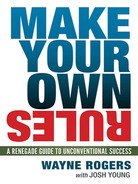EPILOGUE
the free market
I HAVE A PASSION for what we think of as a free-market economy, which, to a great extent, defines the basis of democracy. Without getting too pedantic, if you look back in the history of Western civilization, those nations that have sponsored a competitive free-market economy are also the nations where freedom evolved for their people. These countries were not planned by a central government. They were not organized from the top down.
Where did the basis of a free-market system originate? It came from the fact that, early in the life of Homo sapiens, the species had to rely on others in the group to survive. One man could not do it alone. He could not be as successful when he hunted alone as when he hunted with others; therefore, he learned to hunt with a group. Out of that experience comes a phrase that is critical in our society to this day: reciprocal cooperation. As Vince Lombardi put it, “Individual commitment to a group effort—that is what makes a team work, a company work, a society work, a civilization work.”
If three of us are going to do something for which we need one another, we have to reciprocally cooperate. Out of that relationship eventually comes the word trust. I have to trust you to do your part of the job, and, in return, you have to trust me. This relationship began with primitive people struggling for survival. After we kill the mastodon, we have to trust one another that we will carve up the meat equitably. This increased trust and fairness. Tribal society learned this early on. That is the fundamental basis for deciding how we can cooperate to do better and better things.
Robert Trivers formalized this evolutionary trend in his celebrated 1971 paper under the term “reciprocal altruism.” Some scholars have said that this has become part of our evolutionary heritage: that we have developed an evolutionary propensity to trust. Behavioral anthropologists such as Frans de Waal have written extensively about this predilection in primate society.
Modern society, of course, is much more complicated than was the society of our distant ancestors. If there are only two of us on the desert island, it’s simple to make collective decisions. But then, as more and more people become part of society, we need to have rules that modify our collective behavior so that we maintain our individual freedom. Eventually, those rules become codified into written law, something that the society recognizes to be above all individuals, so that disputes are settled peacefully, commercial activity can grow, and the standard of living is raised for all constituents.
If the basis of the free-market society grew from the reciprocal cooperation of primitive Homo sapiens and if it is a natural progression, perhaps even genetically marked, then we may wonder why the free market is not practiced all over the world. Why can’t there be cooperative, constantly flourishing entrepreneurial activity to solve most of our problems, from energy to health?
Proto-human creatures were driven by one thing: survival. By contrast, our society has become infinitely more complicated, yet more productive, as well, and can solve multiple problems. The only thing that prevents our success is ourselves. Our political, religious, and ideological concepts are in constant conflict. Some nations are committed to totalitarian regimes, others to theocracies. People want to dominate other people, rather than live cooperatively.
Market societies are founded on cooperative living and exchange, as opposed to centralized governments in which economies are planned from the top and control is imposed on the people. Entrepreneurship cannot exist in such economies.
For those of you who want to start a business and to operate your business as freely as you can, take note! The complications of big government, big business, and big labor are making it much more difficult. You will have to be better educated and more creative, do deeper research, and be a master at adapting to the increasingly rapid changes around you, whether scientific, legal, military, religious, or political.
Government collusion with big corporations over everything from banking to automobiles to health care is going to result in a state where the only way for these corporations to be controlled is by that same central government. This is a potential quagmire for the creative entrepreneur. Too big to fail is too big to exist, and as society evolves to larger and more complex organizations, corporations reach a critical mass where self-government becomes tenuous and individual freedoms are sacrificed for the politically determined “good of the whole.”
Alexis de Tocqueville wrote in 1831 in his observation about America, “Americans would rather be equal in slavery than unequal in freedom.” He is saying that if we all want to be reduced to the lowest common denominator, we will not experience individual freedom.
I am saying we cannot let our society go there, because it will be the end of our remarkable free market—and thus the end of the small businessperson, the entrepreneur, and the innovator who lives by this market and makes our civilization possible.
